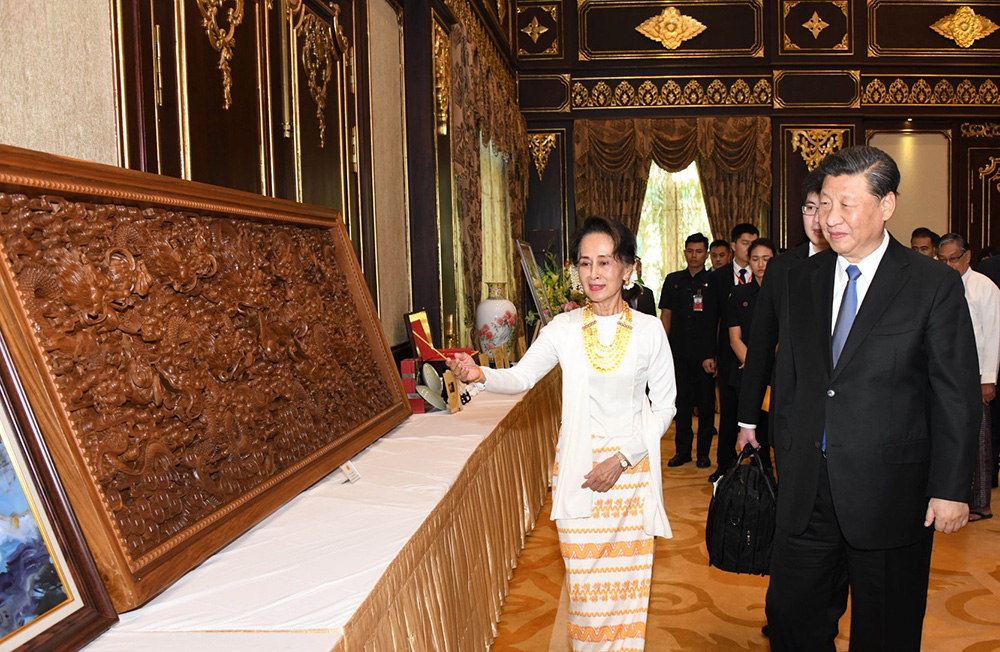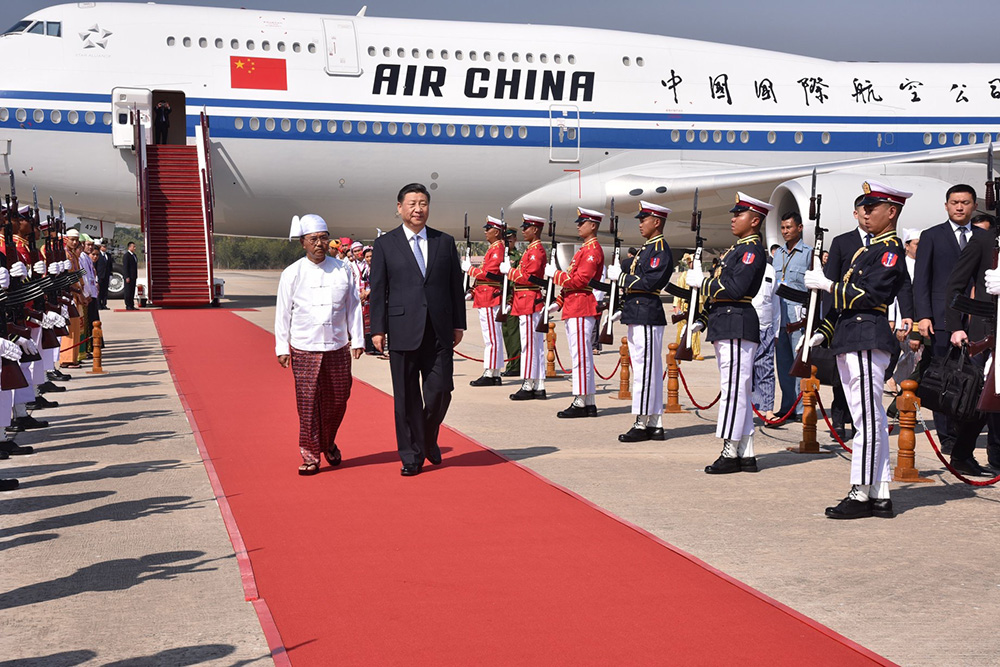YANGON—The recent war of words on social media between the US and Chinese embassies dragged Myanmar into a diplomatic dispute between the two powers. An op-ed by a US diplomat alleged that China’s actions in the South China Sea and its aggressive crackdown on Hong Kong are part of a larger plan to undermine the sovereignty of its neighbors, including Myanmar.
The US diplomat warned that China has threatened and undermined Myanmar’s sovereignty in the form of unregulated banana plantations in Kachin State, questionable investments and corruption in the mining and forestry sectors, and infrastructure projects and special economic zones that pile on debt and require that Myanmar cede regulatory control. He also pointed to rapid environmental destruction, which he said was a result of corruption and poorly regulated investment from China.
In response to the US Embassy, the Chinese Embassy accused the author of the article of “outrageously smearing China” and attempting to sow discord between China and Myanmar, damaging the countries’ relations and bilateral cooperation. It said the article not only reflects the “sour grapes” mindset of the US toward China-Myanmar relations, but also a global effort by the US to shift attention away from its domestic problems and seek selfish political gain.
In fact, US embassies in other Southeast Asian countries including Vietnam, Thailand, Brunei, Indonesia, the Philippines and Malaysia simultaneously announced a tougher US position on the South China Sea issue last week.
A US Embassy spokesperson in Yangon told The Irrawaddy that the tougher US line was prompted by US Secretary of State Mike Pompeo’s July 13 announcement of a change in US policy on maritime claims in the South China Sea that strengthens US support for Southeast Asian coastal states upholding their sovereign rights under international law.
“At the same time, the change also helps uphold freedom of the seas and underscores US opposition to PRC efforts to use coercion to push its unlawful South China Sea maritime claims,” the spokesperson said in an email.
The US’s aim seems to be to shore up support from Southeast Asian countries. However, the exchange of accusations between Washington and Beijing puts regional countries in a difficult position, as they try hard not to take sides between the two superpowers.
Thitinan Pongsudhirak, professor and director of the Institute of Security and International Studies in the Faculty of Political Science at Chulalongkorn University in Bangkok, told The Irrawaddy that rallying US embassies in Southeast Asia to push back against China on the South China Sea is unsurprising because the US has suffered severely from the virus pandemic, and the Trump administration needs a culprit like China.

“Myanmar is not alone in being a contesting ground in the US-China rivalry. The entire Southeast Asia [region] can be seen as broader battle ground,” he said.
The professor explained that the Trump administration now saw Southeast Asia as an arena where the US can push back against China most vigorously because Washington has Thailand and the Philippines as allies and Vietnam as a strong partner, with good ties with most of the rest, except pro-China Cambodia and Laos.
“So taking China to task in its own backyard makes strategic sense for the US,” Thitinan said.
US-China rivalry on Myanmar soil
When the US launched its campaign against China, not all the Chinese embassies in Southeast Asia responded as aggressively as the one in Myanmar.
“It is obvious that the new Cold War has reached Myanmar,” said long-time Myanmar expert Bertil Lintner, adding that the consequences would depend very much on how Myanmar reacts to this.
One reasonable question to raise here is why the US chose to provoke China over its activities in Myanmar by drawing parallels with Hong Kong and the South China Sea issue. While China and Myanmar share a border, those issues seem far away from the country.
One possible reason is that the US is just making the most of the Myanmar public’s anti-Chinese sentiment in general. When the Southeast Asian country was under the military regime, which ruled the country with an iron fist until 2010, China was its sole ally at home and on the international stage whenever the then military leadership was accused of human rights abuses over their bloody crackdowns on political dissidents and ethnic people. In exchange for its support, China was allowed to exploit country’s natural resources, ranging from mining to forest exploitation to oil and gas projects, among others.
Furthermore, most of the huge Chinese projects—from the suspended Myitsone Dam to the Letpadaung Copper Mine to the current BRI projects—have met with opposition from local people, as the projects have uprooted their lives through forced displacement and environmental degradation of their farmland. They worry that China is exploiting Myanmar’s natural resources without any concern for the fate of the local population.
Another possible reason could be Myanmar’s geopolitical importance due to its direct access to the Indian Ocean via the Bay of Bengal, and its position between India and China. With the Chinese presence at their deep seaport and industrial zones at Yanbye and Made Islands in the Bay, maritime security in the area will be a concern for the US as well.

China’s growing leverage in Myanmar’s economy and politics could be a possible reason behind the country’s assertiveness in its rejection of the US accusations. Apart from the multi-billion-dollar BRI projects, China plays a mediation role in the peace process between the government and active ethnic armed groups scattered along the China-Myanmar border. Economically, China is a crucial source of foreign investment for Myanmar, as the Rohingya issue in Rakhine State prompted many Western investors to shun the country on humanitarian grounds.
In its statement on Sunday, the Chinese Embassy in Yangon said the attempts of some Americans to stigmatize China-Myanmar relations are doomed to fail, just like “an ant trying to shake a giant tree.”
“China will work together with Myanmar to stride down the China-Myanmar ‘Gold and Silver Road’, and to jointly write a new chapter for China-Myanmar friendly cooperation in a new era,” it said.
When asked why the US had drawn parallels between Myanmar and the South China Sea and Hong Kong issues, a spokesperson from the US Embassy in Myanmar told The Irrawaddy that they raised these issues only because they support Myanmar’s autonomy.
“We are concerned about policies and behavior of the government of the People’s Republic of China that impede it,” the spokesperson said.
Neutral foreign policy
In the wake of the spat between China and the US, Myanmar’s Foreign Ministry urged powerful countries to maintain good relations, saying Myanmar has practiced a neutral foreign policy since independence in 1948, while maintaining good will in its relations, based on mutual interests, with countries near and far.
“Myanmar wants to see good relations between the great powers. Such good relations are in the interests of ASEAN countries, including Myanmar,” U Soe Han, permanent secretary at the Ministry of Foreign Affairs, told The Irrawaddy.
So, how will this dispute between two powerful nations affect Myanmar?
Thitinan from the Institute of Security and International Studies said the US-China dispute will give Myanmar some leverage. “But the Myanmar leadership has to navigate deftly with clear objectives in mind, not going too far to one side or the other,” he warned.

While the Myanmar government insists the country is maintaining its neutral foreign policy, many observers have been critical of Myanmar’s tilt toward China as the West turns away due to the Rohingya crisis in Rakhine State. Myanmar had warm relations with the US under the Obama administration. However, things turned sour when the Rohingya issue drew an international outcry after the NLD came into office in 2016. This is where China came in with investments, and even support at the UN, while the US repeatedly pushed the UN Security Council to adopt resolutions against Myanmar on the issue.
Lintner, the Swedish journalist and Myanmar observer, thought the fact that the US statement refers to Myanmar in the context of the South China Sea and Hong Kong issues could be an indication that the West is beginning to look beyond the Rohingya issue.
“It seems to me that the West is realizing that only China benefited from their turning their backs on Myanmar because of that issue,” he said.
You may also like these stories:
Myanmar Urges Calm After Social Media Spat Between US, Chinese Embassies
As the US and China Spar, Myanmar Walks a Tightrope
Sino-US War of Words in Myanmar a Test of Naypyitaw’s Allegiances

















